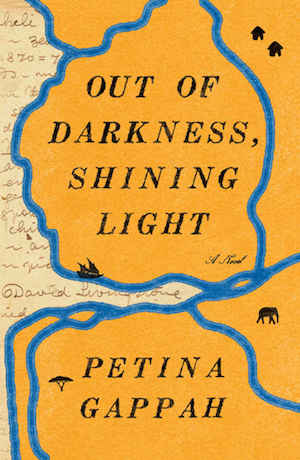In 1873, Scottish explorer David Livingstone died of dysentery and malaria. He was in the area that is now Zambia searching for the source of the river Nile. Doctor Livingstone, who is credited with being the first European to cross south-central Africa, kept a journal of his explorations – his life and his multi-year, obsessive pursuit to locate the beginning of Africa’s longest and most well-known river are thoroughly documented from his perspective. Livingstone stubbornly wandered through Africa for seven years, the last four of which he was extremely ill, yet he refused to abandon his quest.

Petina Gappah’s novel Out of Darkness, Shining Light (2019, Scribner) picks up at Livingstone’s death, where his assembled party of freed slaves and servants decide to carry the doctor’s bones over 1,500 miles through Africa to the coast so that he may be buried back home. Told from the perspectives of Halima, a rambling, gossipy and, oftentimes, hilarious cook, and Jacob Wainwright, a zealous attendant from a missionary school, Gappah’s story offers a voice to those participants in this historical event who had gone previously unheard.
A colonial missionary, much has been said about David Livingstone’s travels and his legacy. Though Livingstone opposed slavery – his less-than-straightforward plan in looking for the source of the Nile was part of his larger hope to bring an end to the slave trade – he relied on and befriended slave traders during the latter part of his travels as his situation became more dire and his resources more scarce. While Livingstone’s stated intentions as an explorer appeared to be well meaning, the consequences proved to be much more complicated. Out of Darkness, Shining Light’s prologue asks, upon pondering the decision to bring Livingstone’s body across Africa, “What if we had known then what we know now?”
Livingstone’s papers, which accompanied his body on the long trip back to Europe, was some of the first documentation to map out the Congo. European access to these papers paved the way for the Congo’s bloody and atrocity-filled occupation some years later.

Zimbabwean author Petina Gappah painstakingly researched Out of Darkness, Shining Light – excerpts from David Livingstone’s journals are sprinkled throughout the text, as well as journal excerpts of Henry Morton Stanley, another famed explorer who located Livingstone in the wild and is credited with the oft-repeated phrase “Dr. Livingstone, I presume?” upon finding him.
Though the words of these journals provide historical context, it is Gappah’s characters who bring life to this version of the story. Halima is strong-willed and opinionated – her firm argument to bring the doctor’s body back convinces the rest of her travel companions to take on the grueling task. Jacob Wrainwright simultaneously offers a differing and sometimes contradictory perspective to Halima’s – born in Africa and sold into slavery as a child, Jacob was rescued and sent to a missionary school in India where he learned English and became a devout Christian who is determined to spread his faith.
Gappah’s historic fictional account is at times dense, but the narration and focus of her characters gives an old and complex story a new, welcomed perspective. Check out Out of Darkness, Shining Light at your closest Denver Public Library location.
Hannah Evans is the senior librarian at the Smiley Branch of the Denver Public Library.

Be the first to comment